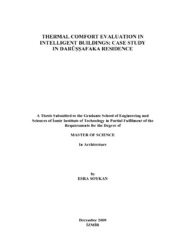Please use this identifier to cite or link to this item:
https://hdl.handle.net/11147/3035Full metadata record
| DC Field | Value | Language |
|---|---|---|
| dc.contributor.advisor | Kazanasmaz, Zehra Tuğçe | en |
| dc.contributor.author | Soykan, Esra | - |
| dc.date.accessioned | 2014-07-22T13:50:45Z | - |
| dc.date.available | 2014-07-22T13:50:45Z | - |
| dc.date.issued | 2009 | en |
| dc.identifier.uri | http://hdl.handle.net/11147/3035 | - |
| dc.description | Thesis (Master)--İzmir Institute of Technology, Architecture, İzmir, 2009 | en |
| dc.description | Includes bibliographical references (leaves: 109-111) | en |
| dc.description | Text in English;Abstract: Turkish and English | en |
| dc.description | x, 178 leaves | en |
| dc.description.abstract | Building performance evaluation studies has been an important research area in recent years. Technologic developments, increasing demands of users, complexity of buildings, increasing energy consumption in complex buildings and economic factors force designers to find new solutions. There are several studies in literature using building evaluation techniques to suggest standard values for comfort conditions. Intelligent buildings, that have purpose to fulfill comfort conditions effectively while minimizing energy consumption, take an important part in performance evaluation studies.The main objective of this study is evaluating the indoor thermal comfort conditions in a selected building, in terms of thermal comfort requirements. An Intelligent building; Darüşşafaka Residence selected as a case building. The research aims to reach the refined and precise knowledge about thermal comfort requirements. Complex structures and intelligent buildings are often preferred in building evaluation studies. In this study the research field is a residential building, a kind of dormitory for old people over the age of 65. Thermal comfort evaluation of the building has been conducted in two ways namely objective analysis and subjective analysis. Objective analysis includes field measurements of variables that affect thermal comfort.Measurements done by specific equipment called data logger. Subjective data analysis acquired by occupant.s ideas with interviews. Quantitative data obtained from the objective analysis supported by the qualitative data acquired from individuals. Thus, the results of thermal comfort conditions are interpreted with respect to various thermal sensations of old people. Using both objective and subjective results permitted to evaluate the thermal perception of users. | en |
| dc.language.iso | en | en_US |
| dc.publisher | Izmir Institute of Technology | en_US |
| dc.rights | info:eu-repo/semantics/openAccess | en_US |
| dc.subject.lcc | TH6012. S73 2009 | en |
| dc.subject.lcsh | Intelligent buildings | en |
| dc.subject.lcsh | Buildings--Thermal properties | en |
| dc.title | Thermal comfort evaluation in intelligent buildings; case study in Darüşşafaka Residence | en_US |
| dc.type | Master Thesis | en_US |
| dc.institutionauthor | Soykan, Esra | - |
| dc.department | Thesis (Master)--İzmir Institute of Technology, Architecture | en_US |
| dc.relation.publicationcategory | Tez | en_US |
| item.languageiso639-1 | en | - |
| item.fulltext | With Fulltext | - |
| item.openairecristype | http://purl.org/coar/resource_type/c_18cf | - |
| item.openairetype | Master Thesis | - |
| item.grantfulltext | open | - |
| item.cerifentitytype | Publications | - |
| Appears in Collections: | Master Degree / Yüksek Lisans Tezleri Sürdürülebilir Yeşil Kampüs Koleksiyonu / Sustainable Green Campus Collection | |
Files in This Item:
| File | Description | Size | Format | |
|---|---|---|---|---|
| T000212.pdf | MasterThesis | 2.87 MB | Adobe PDF |  View/Open |
CORE Recommender
Page view(s)
648
checked on Jul 22, 2024
Download(s)
634
checked on Jul 22, 2024
Google ScholarTM
Check
Items in GCRIS Repository are protected by copyright, with all rights reserved, unless otherwise indicated.